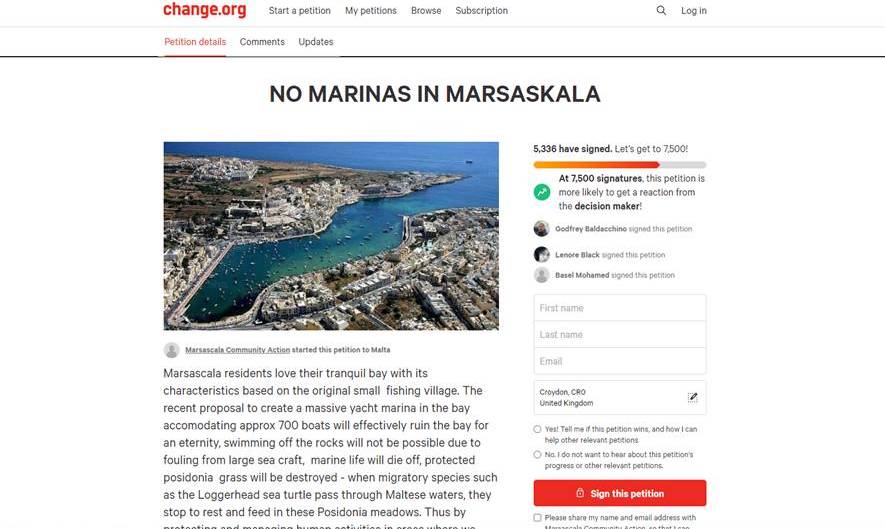 The Marsascala Community Action petition page is aimed at preventing the construction of a 700-berth marina in this fishing village in Malta.
The Marsascala Community Action petition page is aimed at preventing the construction of a 700-berth marina in this fishing village in Malta.
[This is an excerpt from an article in The Round Table: The Commonwealth Journal of International Affairs. Opinions do not reflect the position of the Round Table editorial board.]
Property remains the obvious and safe investment target, in what is geographically the tenth smallest country in the world – only slightly smaller than Grenada – but supporting a population of half a million residents, around a quarter of whom were not born in Malta. And that is not the end of the story: the country’s resident population is projected to continue to increase – mainly via net immigration – over the coming decades; so a stock of apartments geared to accommodate these newcomers makes economic and investment sense.
All this comes at a terrible cost. The protection of the environment and heritage buildings has become the major cause of local protest. On the smaller island of Gozo, all local council mayors and major associations have voiced their alarm at the frenzied rate of development that risks destroying the magic and allure of Malta’s greener and less heavily populated sister island. With little effect. I am myself involved in trying to stop and protest the transformation of the creek in my home coastal town of Marsaskala into an all-year-round marina for 700 yacht berths. Grassroots organisations in many towns and villages have rallied to stop rampant development; and limited successes give some hope that such decisions can and may be reversed.
The local construction industry has proved to be resilient during the Covid-19 pandemic. And many Maltese now relish the opportunity to add rent receipts to their income portfolio. Building regulations have had to be beefed up, especially after residents have died or miraculously survived as a result of their buildings collapsing due to shoddy construction work alongside. Concurrently, post-material values, such as ‘quality of life’, are becoming more mainstream in political discourse. The Government responds with policies that seek to meet and allay these concerns somewhat, by investing in embellishment projects, including parks, afforestation initiatives and ‘vertical gardens’. But: is this too little, too late?
Young children are growing up in an environment where there are few safe, open spaces for outdoor play. Can we expect them to be outraged by further urban sprawl?
Some years ago, I had argued that Malta should buy the neighbouring island of Pantelleria from Italy, shower it with investment and rescue its own residents from a double insularity that has spelt neglect, relative poverty and policy oblivion. Some thought I was joking, outright delusional or merely wanting to transpose Malta’s construction behemoth onto a still underdeveloped neighbouring island. But I was dead serious. The Mayor of Pantelleria reached out and felt it was an idea worth pursuing.
Malta is flush with savings; and construction has provided the vent for such savings to be reinvested into the local economy, with considerable multiplier effects, and tragic environmental ones.
Godfrey Baldacchino is the Professor of Sociology, University of Malta.



